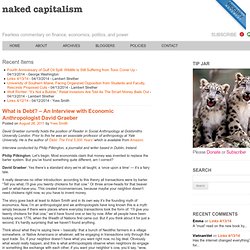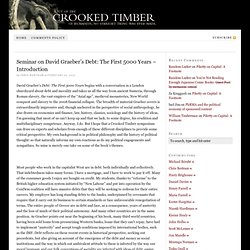

No ens fa vergonya explicar que som pobres, perquè aquesta condició, més que definir-nos a nosaltres, els defineix a ells. What is Debt? – An Interview with Economic Anthropologist David Graeber. David Graeber currently holds the position of Reader in Social Anthropology at Goldsmiths University London.

Prior to this he was an associate professor of anthropology at Yale University. He is the author of ‘Debt: The First 5,000 Years’ which is available from Amazon. Interview conducted by Philip Pilkington, a journalist and writer based in Dublin, Ireland. Philip Pilkington: Let’s begin. Most economists claim that money was invented to replace the barter system. David Graeber: Yes there’s a standard story we’re all taught, a ‘once upon a time’ — it’s a fairy tale. It really deserves no other introduction: according to this theory all transactions were by barter. The story goes back at least to Adam Smith and in its own way it’s the founding myth of economics. Think about what they’re saying here – basically: that a bunch of Neolithic farmers in a village somewhere, or Native Americans or whatever, will be engaging in transactions only through the spot trade.
How did this happen? Cómo hacer que la gente se interese por la pobreza >> 3500 Millones. Refugiadas malienses en el norte del Níger.

Foto: © UNHCR/H.Caux Hace algunos años, el lingüista estadounidense George Lakoff se hizo popular por su libro No pienses en un elefante. Basándose en la existencia de una serie de valores individuales y en los símbolos que utilizamos para expresarlos, Lakoff argumentaba que unas ideologías han tenido mucho más éxito que otras a la hora de influir a los votantes, lo cual explica la preocupante deriva de las políticas de interés público como inmigración, salud o educación. El caso es que un grupo de organizaciones y expertos de la sociedad civil británica han usado este mismo marco conceptual para tratar de contestar una pregunta fundamental: ¿cómo podemos reducir la distancia que existe entre la opinión pública y las políticas de lucha contra la pobreza? El diagnóstico que se describe en la primera parte del informe resulta desolador.
Y esa es la batalla que, según Lakoff, ganan por goleada los ideólogos conservadores. Seminar on David Graeber’s Debt: The First 5000 Years – Introduction. David Graeber’s Debt: The First 5000 Years begins with a conversation in a London churchyard about debt and morality and takes us all the way from ancient Sumeria, through Roman slavery, the vast empires of the “Axial age”, medieval monasteries, New World conquest and slavery to the 2008 financial collapse.

The breadth of material Graeber covers is extraordinarily impressive and, though anchored in the perspective of social anthropology, he also draws on economics and finance, law, history, classics, sociology and the history of ideas. I’m guessing that most of us can’t keep up and that we lack, to some degree, his erudition and multidisciplinary competence. Anyway, I do. But I hope that a Crooked Timber symposium can draw on experts and scholars from enough of these different disciplines to provide some critical perspective. Most people who work in the capitalist West are in debt: both individually and collectively.